Right relationships through regenerative agriculture
An IVEPer and supervisor reflect on stewardship at Jubilee Climate Farm in Harrisonburg, Va.
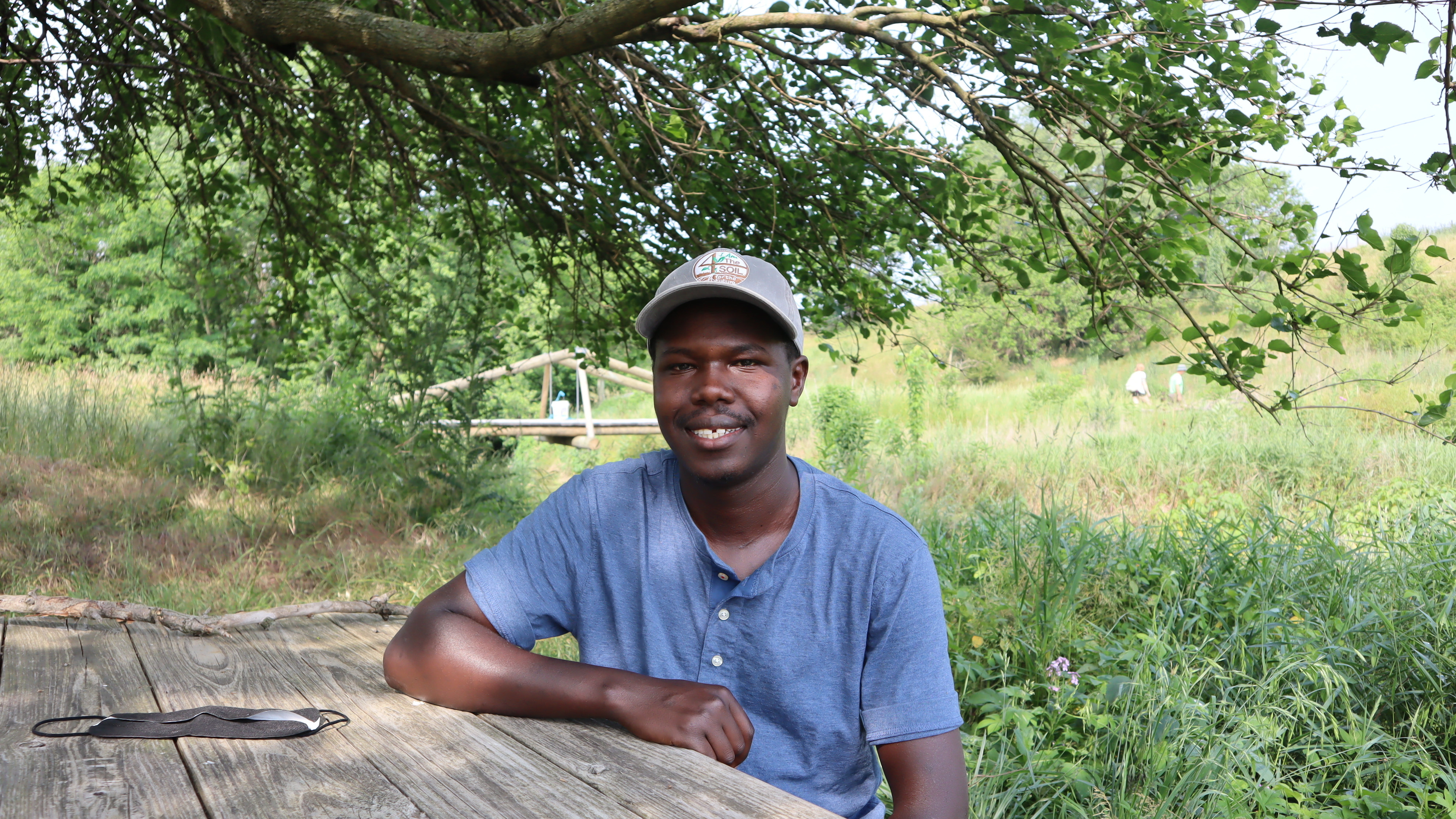
To forget how to dig the earth and to tend the soil is to forget ourselves."
Mohandas K. Gandhi
A chorus of birds sounds steadily in the wetlands, amplified by the stoic hills of the Shenandoah Valley. These sounds surround me as I cross a quiet backroad and arrive at the entrance of Jubilee Climate Farm. A wooden sign and several rows of luscious-looking vegetables are first to welcome me.
Though this would be a great place for relaxation and sightseeing, I was visiting with several goals in mind:
- Learn about the farm’s radical agricultural practices and research.
- Reflect on how these practices relate to Anabaptist values of creation care and stewardship.
- Visit and talk with Samuel Lasiti, an MCC International Volunteer Exchange Program (IVEP) participant about his experience volunteering on the farm.
As the Climate Communications Intern for Mennonite Central Committee (MCC)’s East Coast Region this summer, I was excited to learn more about this project and Samuel’s experience on the farm as an IVEP participant.
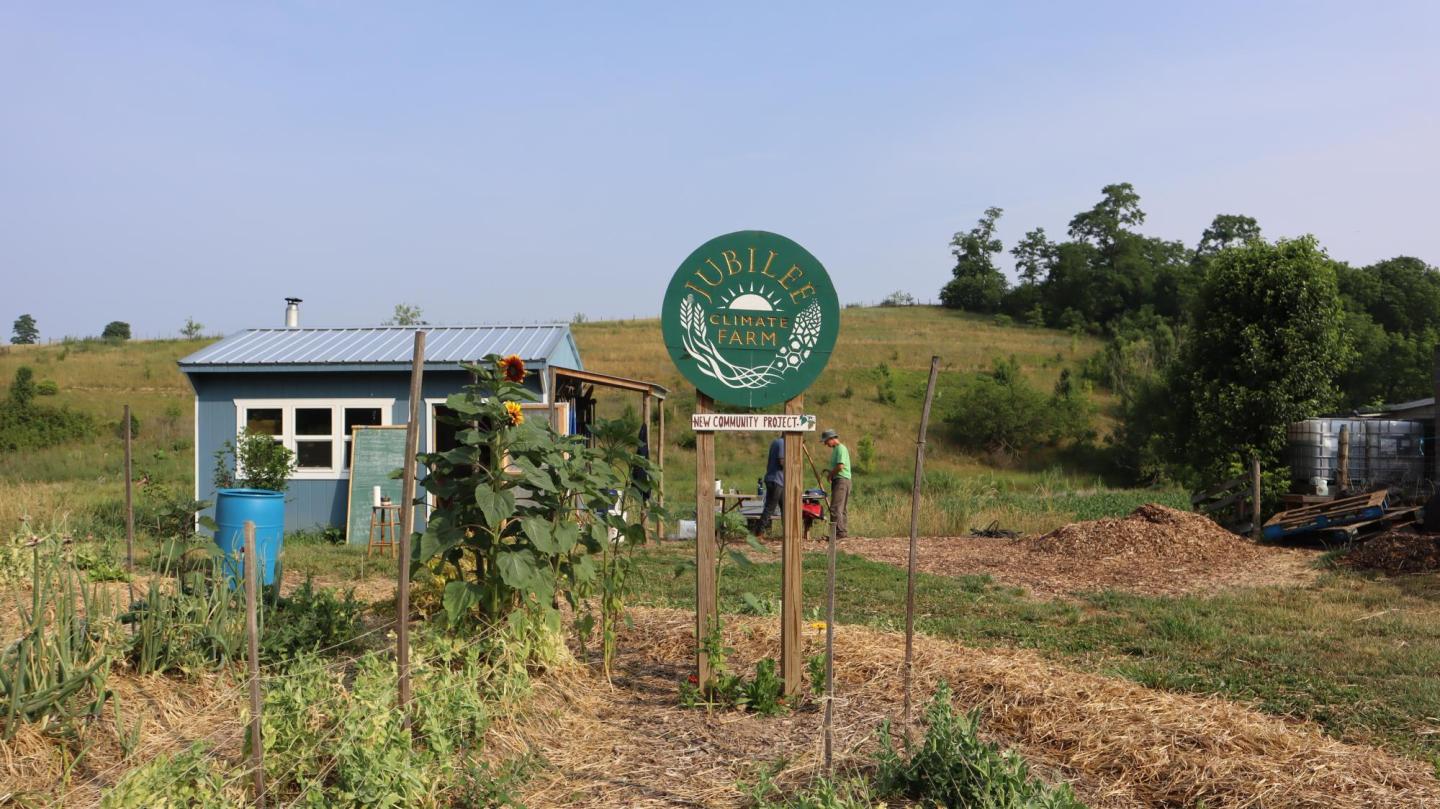
Jubilee Climate Farm is part of a New Community Project in Harrisonburg, Virginia. Though a small organization, the New Community Project is focused on environmental sustainability and social justice all around the world. Jubilee Climate Farm reflects these themes well as it is dedicated to the restoration and redistribution of land, knowledge and food.
Tom Benevento is Samuel’s supervisor at Jubilee Climate Farm and coordinates the local New Community Project (NCP) in Harrisonburg. As we talked, he shared that agroforestry farming, the practice of combining trees with traditional farming practices, tends to host more insects, butterflies, and birds, as compared to a fully mature forest. Learning this was no surprise to me as I noted countless red-wing blackbirds flitting around the wetlands. They seemed to greet each other with a shrill ‘ok-ka-lee’ that carried over the marsh.
The farm has five full-time staff as well as several volunteers and interns from the surrounding community. One of those volunteers is Samuel Lasiti, a participant in MCC’s International Volunteer Exchange Program (IVEP).
IVEP is a yearlong volunteer work and cultural exchange opportunity for young, Christian adults. Participants from around the world come to the United States to volunteer with a local organization, attend a local church and live with a host family.
Samuel is from Kajiado County, Kenya and volunteered at Jubilee Climate Farm from August 2022 through July 2023 with the hope of learning more about regenerative agricultural practices and gaining a broader global perspective.
Samuel wrapped up his placement in July 2023. He reflected on his experience saying, “I came here and started working in late August [2022], and it’s been a really good experience because the placement was a good match. I have been lucky to be in this place.”
Agriculture runs in Samuel’s veins. His passion for the practice originated from his work on his family farm, and he’s been working in agriculture for the past five years.
In Kenya, agriculture can be considered a dirty or undesired profession, but Samuel takes a different approach. He shares, “It’s [regenerative agriculture] connected to the earth and how God blessed this land with creation and fertile soil so that we can grow food and learn from it. [God gives] us strength to be able to work with the land and take care of it.”
Regenerative agriculture focuses on the health of the land and emphasizes values of conservation and rehabilitation. This style of farming fits very well with the values of creation care. Samuel supports this by saying, “Man’s responsibility is to take care of Creation and everything that God made. God helps us with what we produce. As we take care of the environment, we benefit from it as it helps us to provide food for us.”
When we take care of the environment and listen to the land’s needs, it will be able to provide for us in more sustainable ways. This style of farming not only increases overall productivity on the land, but also gives back to the environment and creates healthy relationships between land and people.
During the tour, Samuel highlighted several regenerative agricultural systems that the farm is implementing. Since Jubilee Climate Farm is a new organization (established in March of 2021), there is a lot to be done to increase productivity of each system. The farm focuses heavily on research and is currently working to increase carbon sequestration, soil health and food production within these practices.

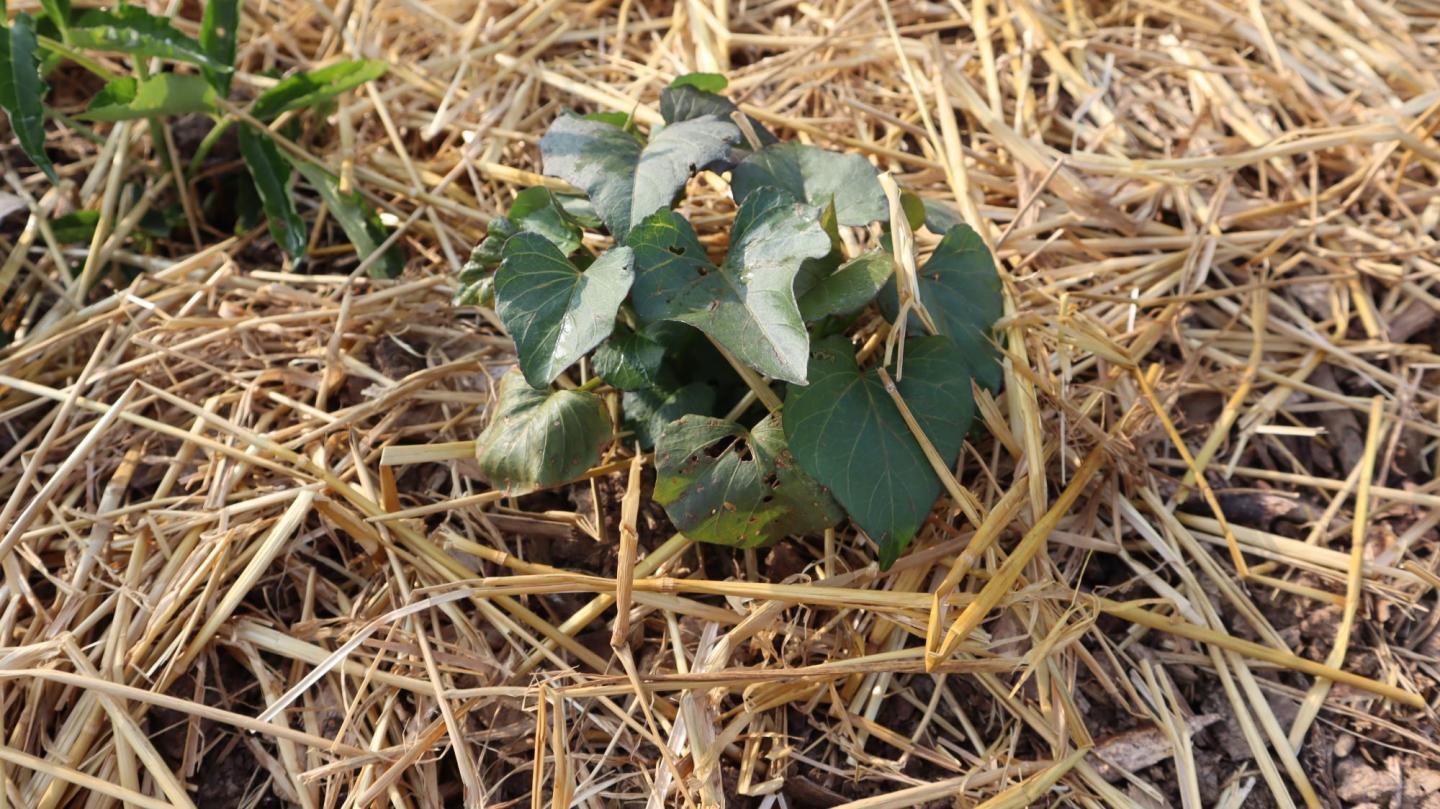

On the tour, Samuel stopped over a bridge to point out a small creek running through the farm. He explained that high levels of nitrates enter the stream from manure usage and encourage algal growth. Now, the stream cannot be used to water crops or livestock and is uninhabitable for many wildlife species.
Riparian buffers are one way to reduce the levels of nitrates that run into waterways, by increasing the number of trees along the banks. The roots of the trees help to filter the water that enters the stream. Jubilee Climate Farm has planted around 400 trees along the bank in hopes of filtering nitrates out of the water before it reaches the creek.
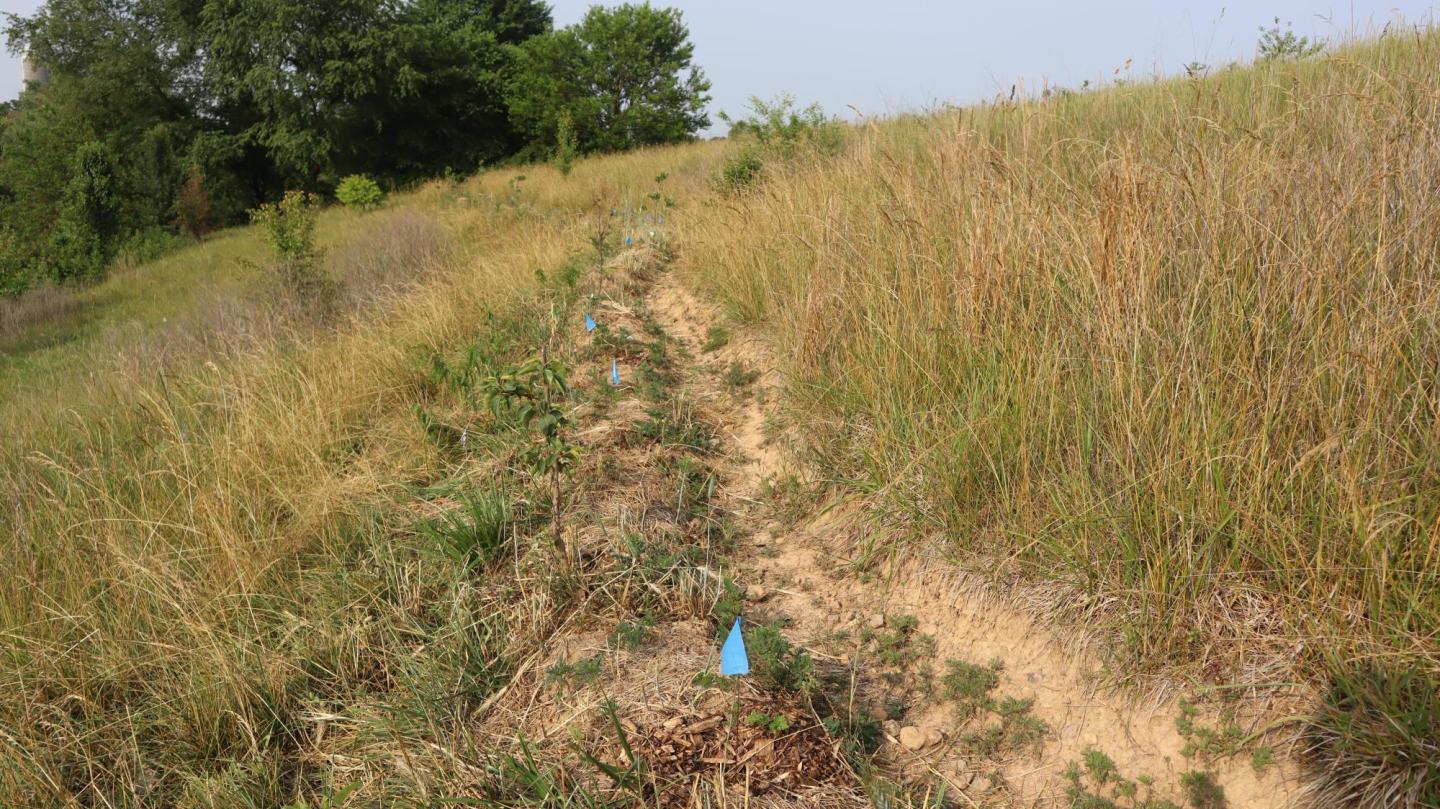
On the last leg of the tour, we followed a zigzagging path to the top of the hill behind the farm. Samuel mentioned that the path was created using a traditional method that follows the contour of the land. This method allows for maximum water retention and usage.
The tall golden stalks of rye swayed in the wind as we stopped to examine a carved-out gully that ran along the side of the hill. This swale, as Samuel explained, is one of five on the hill and is used to prevent erosion and help water to absorb into the soil. These swales are part of a silvopasture practice, the regenerative agricultural strategy of integrating trees into pastures with livestock to increase the overall productivity of the land. Several species of trees grow on top of each swale and will provide crops. Below each swale, a second row of trees will provide food for the livestock.
The farm hopes to introduce sheep to the land in a year. These sheep will graze on the trees below the swale and fertilize the land with manure, restoring the soil quality.
Using regenerative agricultural practices like those of Jubilee Climate Farm are great examples of caring for God’s creation and practicing more sustainable farming techniques. Samuel states, “we are not being pushed to do it, but it is a responsibility, something that you believe in and are committed to even with limited resources. Doing what you can with what you have [is] to [be] a steward of the earth.”
Stewardship as a spiritual discipline can take on many different forms. God calls us to be stewards of the earth, to take care of it, listen to it and live in existence with it. Genesis 2:15 states: “The Lord God took the man and put him in the Garden of Eden to work it and take care of it.” Like Adam, we are called to care for our Garden of Eden: the earth around us.
Tom reflects on regenerative agriculture by saying, “It's a very humbling kind of process because it's more listening and it's more responding rather than the domination over. I really think that that's what God wants - [for] us to be in relationships to nature in that way.”
Tom goes on to say. “Humans are designed to be with nature, and we are nature. We can become the best nature that we are.”
Samuel plans to return to Kajiado County, Kenya at the end of his IVEP experience. He is excited to continue using his passion for sustainable agriculture and implement these practices on his family farm. In his home community, Samuel works with youth from 15 different churches. He hopes to inspire them to become passionate about regenerative agriculture and farming. Farming in semi-arid counties like Kajiado County depends on rainfall which is becoming scarcer due to the effects of climate change.
According to Tom, Jubilee Climate Farm hopes to influence other farms throughout the Shenandoah Valley and beyond to implement a more hands-on approach of agroforestry in the future. The farm would also like to connect and create alliances with low-income and marginalized farmers around the world and cultivate “…right relationships to where people live and the communities they are in.”
“Humans are not designed for mechanized office [or] indoor work, but we are made to be engaged with nature and engaged with the soil. It’s who we are as human beings. We have forgotten that,” he says.
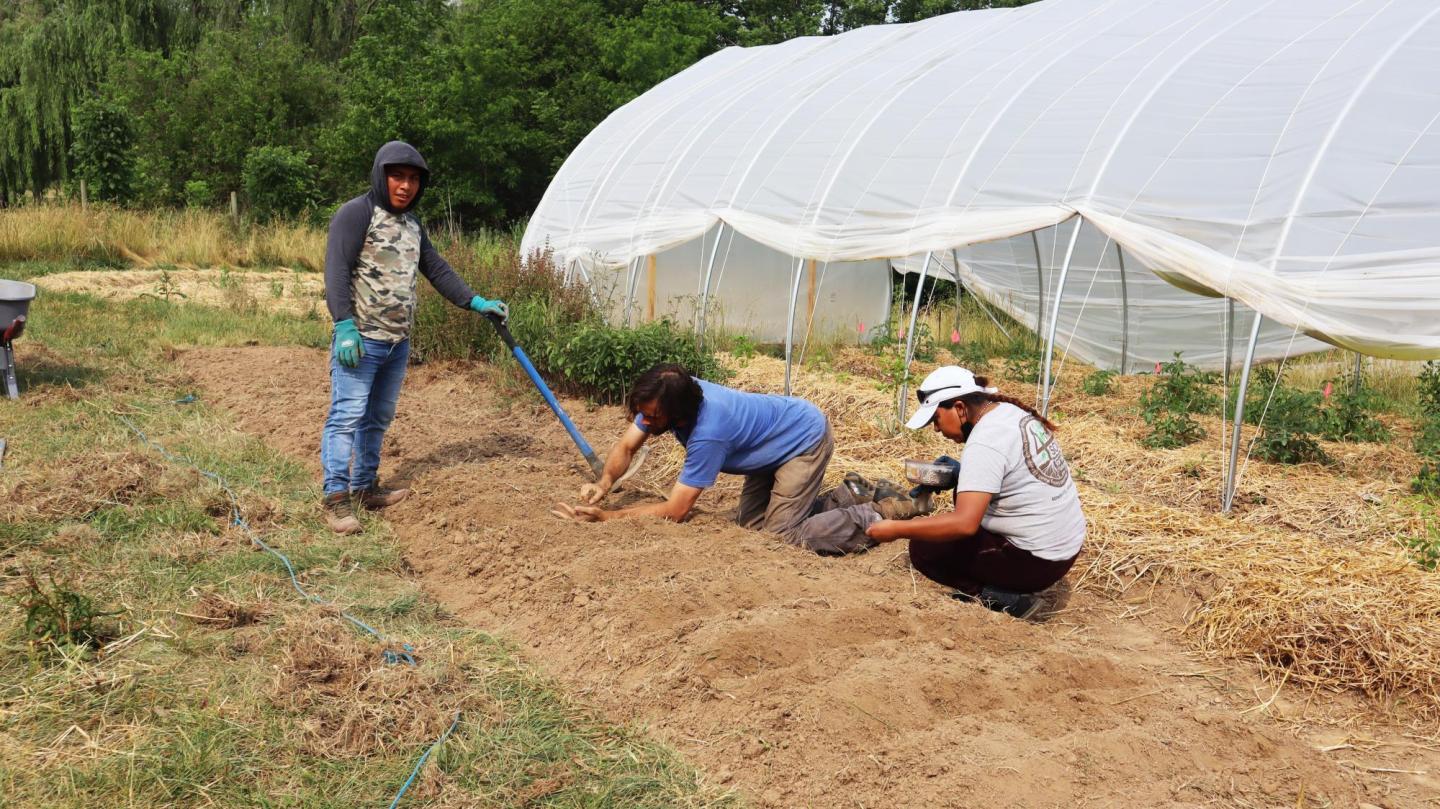
After talking with Samuel and Tom and seeing their beliefs and values transform the work that they do on the farm, I took a moment to reflect on how my beliefs and values influence and impact my actions, opinions and passions. Growing up in the Mennonite faith instilled in me values of creation care and stewardship. I see both values transforming my life’s path. They influenced my decision to study environmental science and environmental justice, my appreciation for the great outdoors and even my decision to work in my current position with MCC. Stewardship and creation care are more than spiritual practices for me; they are part of my identity and have played a vital role in making me who I am today.
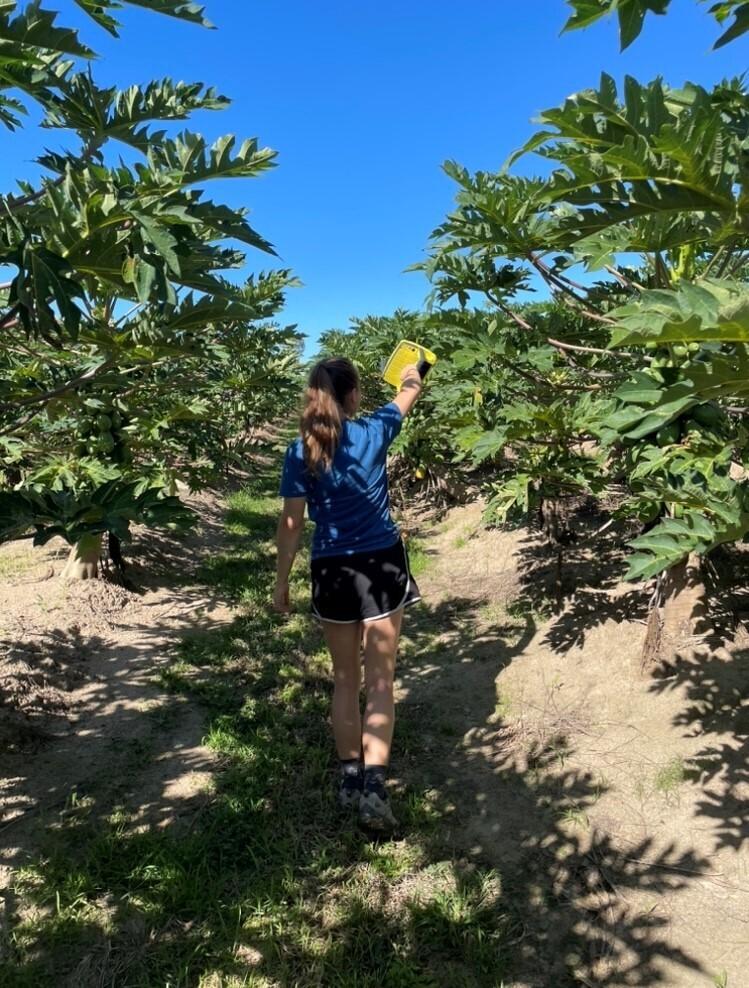
MCC works to put the values of creation care and stewardship into action. As the number of communities around the world affected by climate change continue to increase, MCC works to address climate change through adaptation and mitigation efforts at multiple levels. These include advocating for government action and finance for climate change mitigation and adaptation; strengthening public engagement on climate change; evaluating MCC’s own contribution to climate change; and supporting partners and communities as they reckon with climate change impacts. Indirectly, MCC also supports climate change adaptation through programming that reduces overall household and community vulnerability and improves well-being.
In Kenya, MCC partner Utooni Development Organization is working to improve food security for smallholder farmers in the Machakos, Makueni and Kajiado counties in Kenya through conservation agriculture.
Like Samuel said, being a steward of the earth means accepting the responsibility that we have to care for creation, and doing what we can with what we have to make our world a safer place to live for everyone. Building off of these wise words, I ask myself and you, what can we do with what we have to make the world a safer place for everyone?
Want to get involved with caring for our environment, but don’t know where to begin? MCC’s Climate Action for Peace campaign highlights communities taking important steps to respond to the effects of climate change and mitigate future impacts to the environment. The campaign provides opportunities for those of us in the U.S. to support our global partners by calling on our elected officials to create change on a systemic level.
To learn more about ways you can get involved in your local community or support MCC and our partners in mitigating and adapting to climate change, visit ClimateActionForPeace.com.
Anika Hurst is the Climate Communications Intern for MCC East Coast

